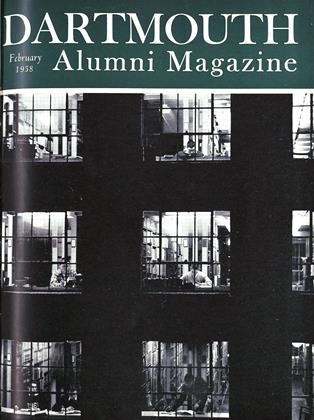THERE have been numerous skillful and informed encomia on the contribution of Ernest Martin Hopkins to the College and the world, and this is but a small word from one of a small group who worked with him and quarreled with him and honored him this side idolatry. Cotty, Max, Pudge, Bob, Sid, Al, Charlie, and ourself were his boys. He taught us what little we ever knew. He was always ready to listen sympathetically to our plaints before cutting us down to size and making us love him the more. He had the genius of running what is too tritely called "a happy ship."
This was not initially true, but evolved as the result either of a careful build-up or, perhaps, of a completely warm heart. In his first year as "the youngest college president in the country" he had to face a rough sophomore class, and nothing in his experience at Filene's or the Tel. & Tel. had equipped him to suffer sophomores gladly - though his earlier years as Secretary to President Tucker and mediator for some of the faculty roughnecks in the Howe Library might have furnished a little training. In any event, he took a dim view of '19's vagaries and liberally chewed us out in consequence; but happily he mellowed, so that by the time we were ready to graduate he accepted us as members of the human race, and has subsequently been the giver and taker of repeated expressions of mutual affection.
Various younger alumni address him as "Hoppy" and name their dogs after him, or refer to him more formally as "Doctor Hopkins." Not his boys! He has always been "Mr. Hopkins" to us, and it is a title of the greatest reverence. He was far more concerned with human qualities than with academic pretentiousness as he wrestled the College into the national institution it is today. At the first "Ivy League" meeting, he gained an accolade from a testy confrere who said, "I'd like to propose a toast to Dartmouth. They decide what's right for them, and then tell everybody to go to hell." He could, and did, say to the Big Three: "We're not interested in joining your Agreement, and I'm not sure, judging by your talk today, that we even want you on our schedules."
From the moment he came home from school and told his father he intended to go to Dartmouth - to which his Cantabridgian sire retorted, "What makes you think you can't get into Harvard?" —he has dedicated himself to the advancement and glory of the College. Characteristically, he has always given chief credit for the new Dartmouth to Doctor Tucker, but his own contribution to the Tucker conception, as undergraduate, as Secretary to the President and of the College, as alumnus, as President, and now as President-Emeritus, has been unmatched. He has constantly kept in mind, and implemented, Eleazar Wheelock's statement: "It is my purpose, by the grace of God, to leave nothing undone within my power, which is suitable to be done, that this school of the prophets may be, and long continue to be, a pure fountain."
The most we can here achieve is an humble salute, but it comes from the heart, and the hearts of all our generation.
 View Full Issue
View Full Issue
More From This Issue
-
 Feature
FeatureWhat Makes a College New?
February 1958 By BANCROFT H. BROWN, B. P., JOHN. NASH '60 -
 Feature
FeaturePsychology at Dartmouth
February 1958 By CHARLES LEONARD STONE '17 -
 Feature
FeatureFastest Man on Skis
February 1958 By BOB ALLEN '45 -
 Feature
FeatureRegional Leaders Named for Campaign
February 1958 -
 Class Notes
Class Notes1918
February 1958 By ERNEST H. EARLEY, W. CURTIS GLOVER, RICHARD P. WHITE -
 Class Notes
Class Notes1936
February 1958 By JOHN A. SAWYER, FRANK T. WESTON
BILL McCARTER '19
-
 Article
ArticleThe Hanover Scene
April 1954 By BILL McCARTER '19 -
 Article
ArticleThe Hanover Scene
May 1955 By BILL McCARTER '19 -
 Article
ArticleThe Hanover Scene
December 1955 By BILL McCARTER '19 -
 Article
ArticleThe Hanover Scene
May 1956 By BILL McCARTER '19 -
 Article
ArticleThe Hanover Scene
May 1958 By BILL McCARTER '19 -
 Article
ArticleTHE HANOVER SCENE
APRIL 1959 By BILL MCCARTER '19
Article
-
 Article
ArticleADMINISTRATIVE OFFICERS MEET
June, 1912 -
 Article
ArticleALUMNI SECRETARIES AND EDITORS MEET AT OHIO STATE
May, 1926 -
 Article
ArticleFootball in Embryonic State
MAY 1927 -
 Article
ArticleGreen Jottings
February 1962 By DAVE ORR '57 -
 Article
ArticleWell,—It's Gone!
June 1931 By E. J. Bartlett -
 Article
ArticleThe Book Reviewer's Function
By FRANCIS BROWN '25

